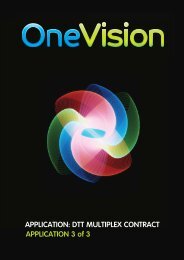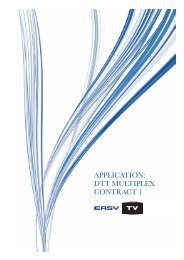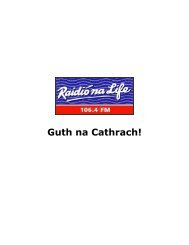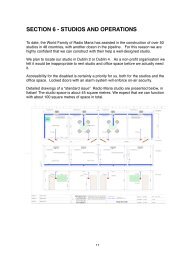Digital Radio for Ireland: Competing Options, Public Expectations - BCI
Digital Radio for Ireland: Competing Options, Public Expectations - BCI
Digital Radio for Ireland: Competing Options, Public Expectations - BCI
You also want an ePaper? Increase the reach of your titles
YUMPU automatically turns print PDFs into web optimized ePapers that Google loves.
capabilities that were allowed in the UK’. In his view, a digital solution had to provide better sound <br />
quality than FM and optimum spectrum efficiency. <br />
While ComReg’s preference may be <strong>for</strong> DAB+, John Doherty emphasized the importance of facilitating <br />
innovation ‘because we don’t think that regulators or Government are very good at picking winners. <br />
Our role is to enable as many approaches as one can and then allow, if you like, the market to <br />
determine which is successful’. He echoed the need <strong>for</strong> a coordinated approach, including the <br />
regulators, the sector and the Department but argued that it ultimately needed a champion. ‘That <br />
champion would have to have the support of the sector. The sector itself would be one of the driving <br />
<strong>for</strong>ces behind it’. <br />
Celene Craig described what the <strong>BCI</strong> see as the three layers of any future policy structure <strong>for</strong> digital <br />
radio. ‘There is the technology piece, the technology including spectrum, there is the economics piece, <br />
the ability… to sustain the digital radio industry and what the impact may be on the existing quite <br />
successful radio industry … and then there is the content piece…what’s the potential <strong>for</strong> content and <br />
the potential add‐on <strong>for</strong> listeners’. Celene Craig and her colleague Neil O’Brien, Director of <br />
Engineering at the <strong>BCI</strong> outlined a window of opportunity with both the new Broadcasting Act 2009 and <br />
the commencement of radio licence renewals in the period 2011 – 2013. 22 The new legislation offers <br />
incentives <strong>for</strong> the sector to move into digital radio by granting them six year extensions on their FM <br />
licences 23 Celene Craig summed up the challenge in shaping a policy: ‘It’s really a question of us <br />
coming up with the model that balances all those…..that gives you something that’s vaguely <br />
economically viable, that makes a good, efficient use of spectrum and that also creates some value <strong>for</strong> <br />
listeners in terms of either additional material or a better listening experience’. <br />
Given the consensus on the need <strong>for</strong> coordination and <strong>for</strong> an agreed policy framework, Paul Byrne of <br />
<strong>Radio</strong> Kerry articulated the next step required <strong>for</strong> involved consultation and recommended that the <br />
regulator should issue a White Paper and open a process of consultation: ‘And that’s crucial. And I <br />
think that would be step one…We may have a view on that policy when it comes out, but certainly the <br />
starting point would be 'Here is what we propose and now let us have your views and thoughts on <br />
that, and we'll progress it from there'. With that, he offered an optimistic outlook <strong>for</strong> the prospects of <br />
developing digital radio: ‘I think that if everyone got behind it and pushed it, and if everyone was <br />
singing off the same hymn sheet in terms of the plat<strong>for</strong>m, than I think that is something that could <br />
very quickly be established in this country, because I do think that we're quite open to things like that’. <br />
<br />
2.3 Technology: DAB versus DAB+? <br />
In a sense, there is little technological debate amongst the interviewees about the choice between <br />
DAB and DAB+. RTÉ’s view is that it chose DAB because it was a proven technology with widely‐<br />
available receivers. It also wanted to be in harmony with the technological plat<strong>for</strong>m available in <br />
Northern <strong>Ireland</strong> and recognises that in the long run DAB+ will be the preferred plat<strong>for</strong>m. ‘We will all <br />
<br />
22 <strong>BCI</strong>. Licence Holders – Contract Durations. <strong>Ireland</strong>: <strong>BCI</strong>, Internal document, received in July 2009. <br />
23 Houses of the Oireachtas. ‘Amendment of sound broadcasting contracts <strong>for</strong> listed simulcast services.’ <br />
Broadcasting Bill 2008 [Seanad] As Passed by Dáil Éireann, Houses of the Oireachtas, June 2009, p.139: The <br />
increase in period during which an existing sound broadcasting contract continues in <strong>for</strong>ce under subsection <br />
(7)(a) shall be not more than 6 years. <br />
45






